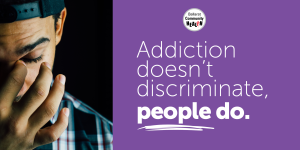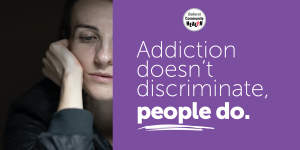Changing language can change lives
The Grampians-Loddon pharmacotherapy network, Orticare, which focuses on harm reduction by improving access to treatment for people with opioid dependency, says using terms like “addict” and “junkie” increases stigma and causes significant harm.
Manager Pauline Molloy said language contributed to widespread stigma which often meant people avoided seeking help.
“Multiple peer-reviewed studies have highlighted the need to de-stigmatise the language of addiction in health care. Using people-first, medically accurate language will reduce stereotyping and dispel stigma,” she said.
“We need to treat addiction as a health condition with the same empathy as we might apply to someone with diabetes or asthma.”
“It’s easy to blame the individual without considering the complex issues behind their drug use. Addiction doesn’t discriminate but people do.”
Orticare is launching a campaign to address stigma and promote strategies to reduce discrimination. Ms Molloy said the greatest risk from stigmatising drug and alcohol use was creating fear and social isolation for those affected and reinforcing negative beliefs about themselves.
“To avoid stigma, people who use drugs may hide their use and may not seek the preventative or treatment help they need. Among people who use drugs, stigma is regularly reported as a major reason for not seeking care and support.”
Stigma also impacts on service providers, getting the media to change language around drug use is a public health priority.
“The community often reflects what is written in the media,” Ms Molloy said.
“We’ve seen some awful examples where language in new stories has the impact of labelling those using drugs as people not wanted by society.”
“The right words can convey hope but the wrong words can decrease self-esteem and have terrible long-term health implications.”
“Patients seeking help about their drug-use should be applauded, not insulted. Using positive person-centred language such as `a person who uses drugs’ or a ‘person with alcohol dependence’ is much better than using negative and inflammatory slang descriptions.”
“These are people with complex health issues who are more than their diagnosis. Seeking help should be a badge of honour, not a mark of shame.”
Orticare, based at Ballarat Community Health, is one of five Pharmacotherapy Area Based Networks in Victoria and covers the Central Highlands, Grampians, Loddon and Mallee regions.
FOR MORE INFORMATION
https://nada.org.au/resources/language-matters/
https://adf.org.au/talking-about-drugs/power-words/ –
https://adf.org.au/reducing-risk/aod-mental-health/identifying-risk-factors/
Contact: Pauline Molloy
Manager Pharmacotherapy Network
03 5338 9142




